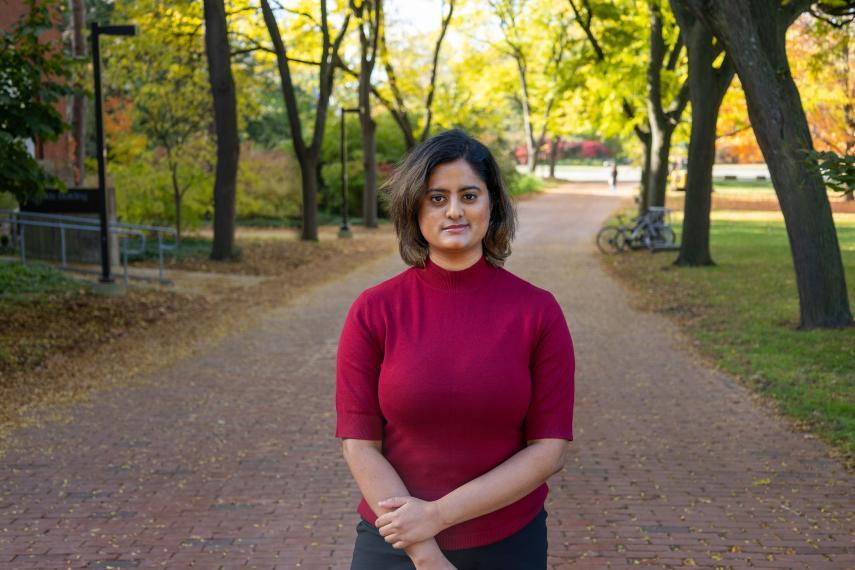Student Feature: Leading Change Through Responsible AI

Meet Keerthana Madhavan, an aspiring changemaker with a passion for ethical and responsible technology. After completing her Bachelor of Computing, Madhavan came to the University of Guelph (U of G) in 2022 and is now pursuing her Master of Science in Computer Science + Artificial Intelligence (AI). As a research assistant, she explores global issues in AI including misinformation, security and governance.
Now Madhavan is a Cybersecurity Engineer with American Express, where she works on securing machine learning and AI systems.
This month, Madhavan was invited to represent Canada as an International Delegate and Speaker at Young Leaders Union Paris 2025 from November 1-4, 2025. This conference brings together emerging leaders from across the world to collaborate and exchange ideas under the shared mission to build a more inclusive and ethical world.
Tell us more about your current role and what excites you most about the work you’re doing.
I recently joined American Express as a Cybersecurity Engineer, where I work on securing machine learning (ML) and AI systems in a research and development role. It’s an exciting position because I get to apply what I’ve learned in my undergraduate and master’s studies in research, software development and cybersecurity.
What drew you to the computing program and collaborative specialization in AI (CSAI) at the University of Guelph?
I really resonated with the University of Guelph’s slogan, “Improve Life.” The environment felt welcoming, especially within the School of Computer Science, which has strong researchers in cybersecurity and AI.
The CSAI program stood out because it’s part of the Vector Institute and combines computer science and AI, which is exactly what I was looking for. I appreciated the program’s interdisciplinary approach and the freedom professors give students to be creative, explore their interests and make an impact. The small class sizes made it easy to exchange ideas, connect with peers and learn about research spanning fields from biology to materials science.
Overall, it’s been a transformative experience that helped me build leadership and communication skills, and feel confident stepping into the professional world.
Was there a particular class or project that really inspired you?
Artificial Intelligence Applications and Society (UNIV*6090) was a class that really inspired me. Taught by four professors across disciplines like philosophy, ethics, data science and bias, it offered diverse perspectives that reshaped how I think about developing AI systems.
Could you share more about your research focus and what inspired it?
Initially, my research focused on AI security and governance, which I wrote a paper on and presented at a conference in Italy. Later, I shifted my focus to misinformation, disinformation and malinformation. I was frustrated by the amount of misinformation in the world and wanted to do something about it.
My current research was inspired by the book Foolproof by Sander van der Linden. It sparked the idea of identifying misinformation through the manipulation tactics people use, particularly in the context of elections. Working with Dr. Stacey Scott and Dr. Luiza Antonie, I helped develop a framework that uses large language models to map how information spreads.
It was exciting to turn something I’d read into a real research problem and bring it to life. I’ve since written and published papers on this work in Italy and Bulgaria.
How have your graduate studies prepared you for your professional career so far?
The research framework is something I really mastered at U of G. I learned how to identify a problem, find relevant resources, conduct a literature review, develop a research methodology and analyze results. Since my current work is predominantly research-based, it’s helped me a lot in problem-solving with a research mindset to drawing meaningful results.
Tell us more about your role at Young Leaders Union – Paris 2025. What are you most looking forward to at this conference?
I’ve been selected to represent Canada as an International Speaker at the Young Leaders Union in Paris. I plan to organize a workshop for delegates from around the world, where I’ll discuss responsible AI and accountability, and how to leverage AI responsibly in leadership.
How do you see Young Leaders Union – Paris as an opportunity to build on your previous work and research in AI and education?
I hope to pursue a career in AI governance and policy, so this conference is a great step in that direction. I’m excited to network with delegates and organizations from around the world and to learn from their diverse perspectives in this field.
At Young Leaders Union you will be speaking on “The Future of Global Education.” What ideas are you most passionate about sharing in this talk?
“The Future of Global Education” relates to agentic AI and large language models, and how we can leverage their accessibility. It’s about teaching delegates, especially those from minority countries, how to use AI responsibly and to their advantage in education. I want to emphasize using AI not just to generate answers, but to empower learners to advocate for themselves and understand their rights in educational, personal and professional spaces.